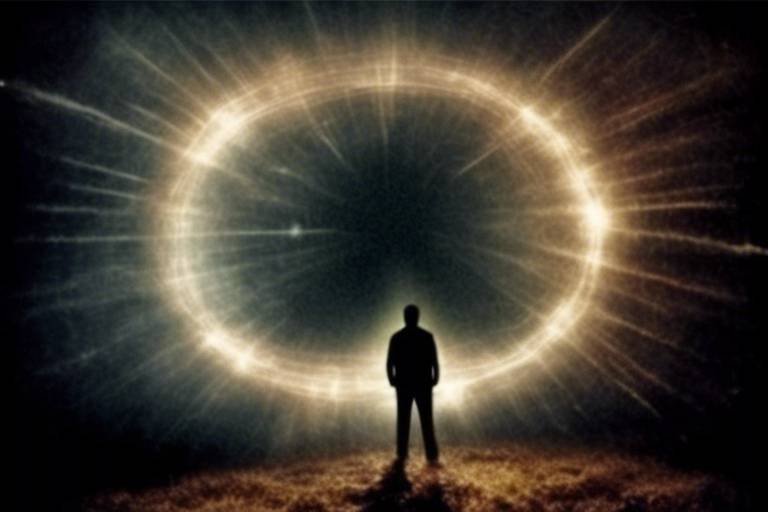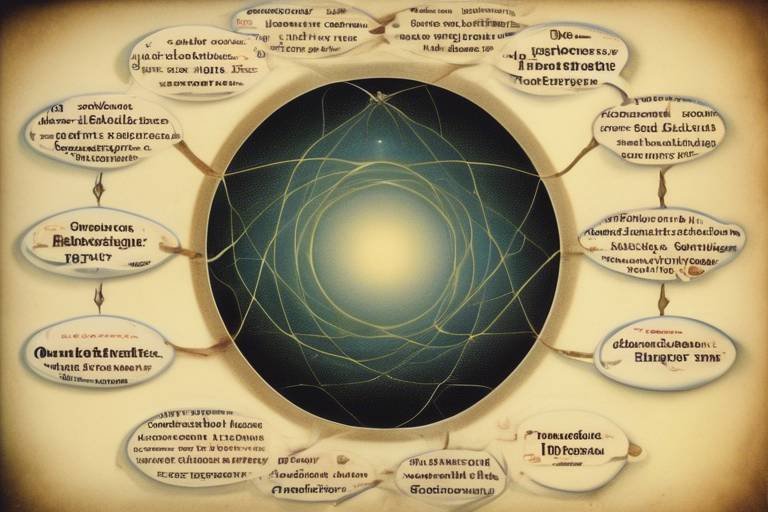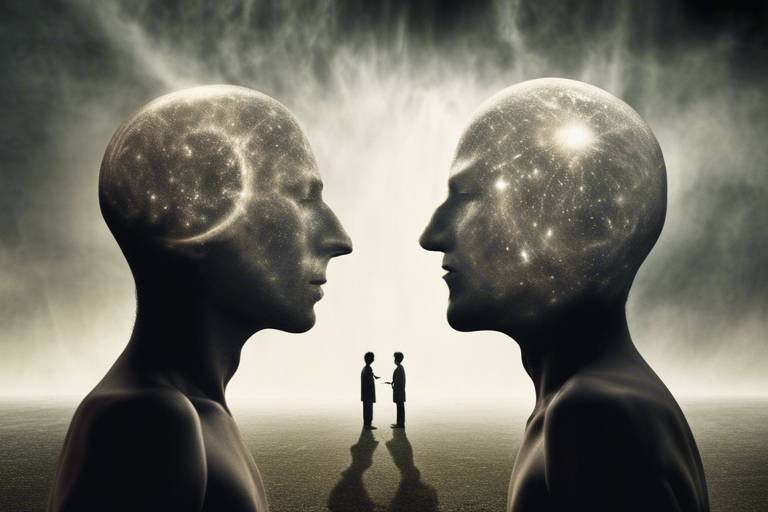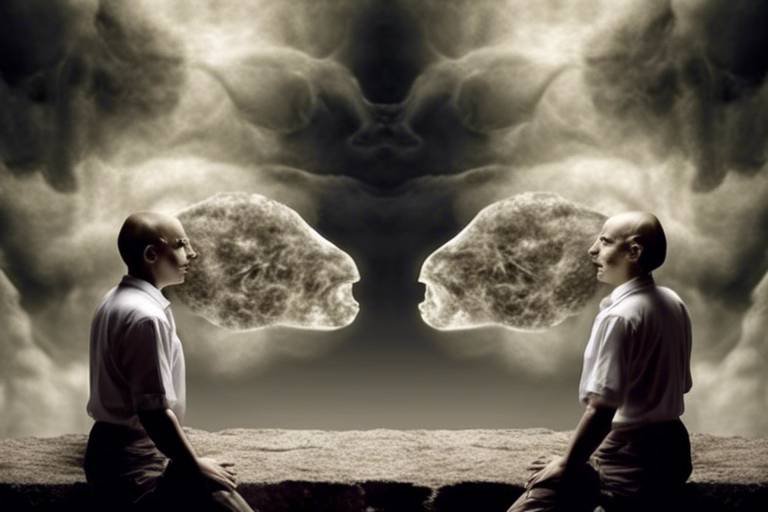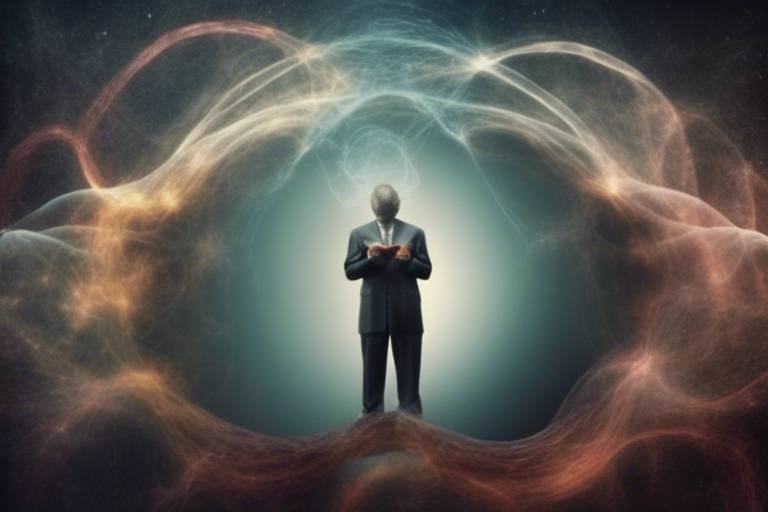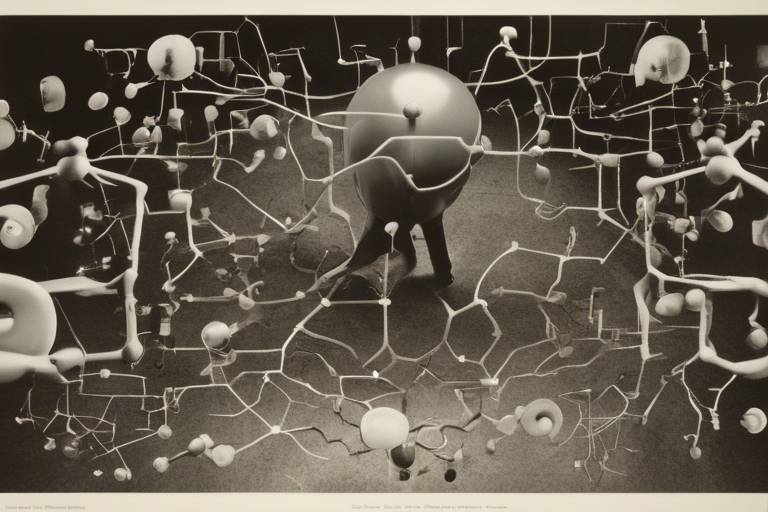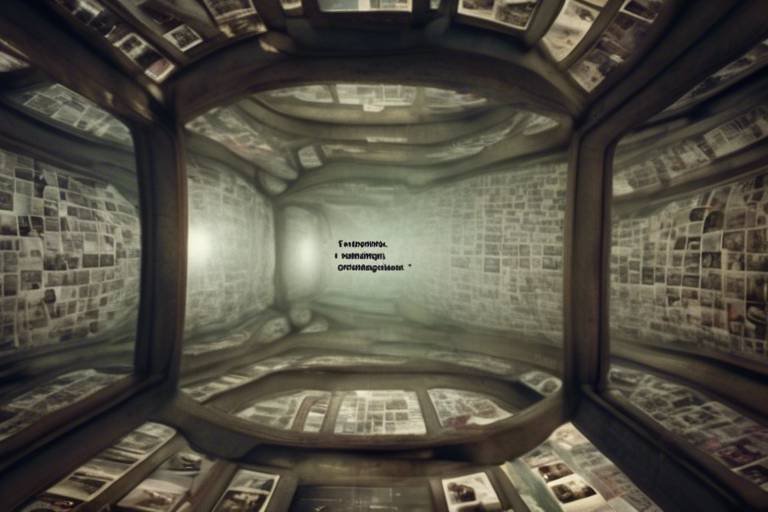Debating the Existence of God: A Metaphysical Dialogue
In the realm of philosophy, few topics ignite as much passion and debate as the existence of God. This discussion transcends mere belief; it delves into the very fabric of reality, ethics, and human experience. As we embark on this metaphysical journey, we will explore various arguments that have been put forth in favor of and against the existence of a divine being. Imagine standing at a crossroads, with one path leading to faith and the other to skepticism. Each step we take along these paths will reveal profound insights into our understanding of existence itself.
At the heart of the debate lies the Cosmological Argument. This argument begins with the assertion that everything that exists has a cause. It’s like a domino effect—one event leads to another. If we trace this chain of causation back, we eventually arrive at an uncaused cause, which many identify as God. Think of it as the ultimate origin of everything, a prime mover that set the universe in motion. This argument raises significant questions: If everything has a cause, what caused God? Is it not possible that the universe itself is eternal? These queries open the door to further exploration of our existence.
Next, we encounter the Teleological Argument, often referred to as the argument from design. This perspective suggests that the intricate order and purpose observed in the universe point to a designer—commonly understood as God. Just as a watch implies a watchmaker, the complexity of life and the universe hints at an intelligent creator. Consider the human eye, a marvel of evolution that operates with stunning precision. How could such complexity arise by mere chance? This argument compels us to ponder the implications of design and intention in our world.
Diving deeper into the Teleological Argument, we arrive at the Fine-Tuning Argument. This assertion posits that the precise conditions necessary for life in the universe are so improbable that they suggest intentional design by a higher power. Imagine a perfectly balanced scale; if the universe's constants were even slightly different, life as we know it would not exist. This remarkable balance raises eyebrows and invites questions about the nature of existence itself.
The Anthropic Principle further emphasizes this notion by highlighting that the universe's laws and constants are finely tuned for human existence. It’s as if the universe was crafted with us in mind. This principle leads to fascinating discussions about divine intervention and the purpose behind our existence. Are we merely observers in a cosmic accident, or is there a greater plan at play?
However, not everyone is convinced by the Fine-Tuning Argument. Critics argue that the apparent fine-tuning can be explained through natural processes or the multiverse theory, which posits the existence of multiple universes with varying laws. In this view, our universe is just one of countless others, and the conditions for life are not as improbable as they seem. This perspective invites us to rethink our assumptions about the universe and our place within it.
Another significant aspect of this debate is the Moral Argument. Proponents of this argument claim that objective moral values exist and can only be grounded in a transcendent source, often identified as God. Without a divine being, how do we account for our sense of right and wrong? It’s like trying to navigate a ship without a compass; moral relativism can lead to chaos. This argument challenges us to consider the origins of our ethical frameworks.
On the flip side, atheists challenge theistic claims by providing secular explanations for morality, existence, and the universe. They argue that belief in God is unnecessary for understanding life and ethics. Atheism offers a different lens through which to view existence, one that relies on reason and empirical evidence rather than faith. This perspective invites a critical examination of our beliefs and assumptions.
Naturalism posits that everything arises from natural properties and causes, leading to a moral framework based on human experience rather than divine command. In this view, morality is a social construct, evolving with society and culture. It’s akin to a river, constantly flowing and adapting to its environment. This raises the question: Can morality truly be objective if it is subject to change?
Finally, Existentialist philosophy suggests that meaning is not inherent in the universe but constructed by individuals. This challenges the necessity of a divine being for purpose in life. Life is like a blank canvas, and it is up to each of us to paint our own meaning. This perspective empowers individuals to take charge of their existence, yet it also raises existential dilemmas about the search for significance in an indifferent universe.
- What is the Cosmological Argument? The Cosmological Argument posits that everything that exists has a cause, leading to an uncaused cause, often identified as God.
- What does the Teleological Argument suggest? The Teleological Argument emphasizes the order and purpose in the universe, implying a designer, typically understood as God.
- How do atheists explain morality? Atheists argue that morality can be understood through naturalism and human experience, rather than a divine source.
- What is the Fine-Tuning Argument? The Fine-Tuning Argument asserts that the precise conditions necessary for life in the universe suggest intentional design.

The Cosmological Argument
The Cosmological Argument is one of the most compelling philosophical arguments for the existence of God. It begins with a simple premise: everything that exists has a cause. This leads us down a rabbit hole of inquiry about the origins of the universe and the necessity of an uncaused cause, often identified as God. Imagine for a moment a chain reaction; every event in our universe seems to be linked to a preceding event. If we trace this chain back, we inevitably arrive at a point where something must have initiated it all. This is where the concept of the uncaused cause comes into play. It suggests that there is a first cause that itself is not caused by anything else, and many proponents of this argument point to this first cause as God.
To illustrate this point further, let’s consider the idea of a domino effect. When you knock over the first domino, it sets off a series of events. If we were to ask, “What caused the first domino to fall?” we would need to find an answer that does not rely on another domino. In the same way, the Cosmological Argument posits that there must be a first cause that is not contingent on anything else. This argument has been articulated in various forms throughout history, notably by philosophers such as Aquinas and Leibniz, each providing unique insights into the necessity of a first cause.
One popular formulation of the Cosmological Argument is the Kalam Cosmological Argument, which specifically addresses the beginning of the universe. It asserts:
- Everything that begins to exist has a cause.
- The universe began to exist.
- Therefore, the universe has a cause.
This leads to profound implications about the nature of that cause. If the universe began to exist, then what could possibly bring it into being? Some argue that this cause must be timeless, spaceless, and immaterial, characteristics that align closely with the traditional conception of God. The argument doesn’t just stop at the existence of a cause; it also invites us to ponder the attributes of that cause. Could it be personal? Many theists believe that it must be, as a personal agent is required to make a conscious decision to create.
However, the Cosmological Argument is not without its criticisms. Some skeptics argue that the universe could be eternal, thus negating the need for a first cause. Others propose alternative explanations rooted in quantum mechanics, suggesting that particles can appear without a cause. Yet, these counterarguments often lead to more questions than answers, as they struggle to provide a satisfactory explanation for the existence of the universe as we know it.
In summary, the Cosmological Argument serves as a fascinating entry point into the larger debate about the existence of God. It challenges us to think deeply about causality, existence, and the very nature of our universe. Whether one finds the argument convincing or not, it undeniably opens the door to profound metaphysical discussions that resonate with our quest for understanding.

The Teleological Argument
The Teleological Argument, often referred to as the argument from design, is a fascinating philosophical perspective that invites us to marvel at the intricate order and complexity of the universe. Have you ever gazed up at the night sky, overwhelmed by the vastness of the cosmos, and wondered how such beauty and precision could arise by mere chance? This argument suggests that the remarkable features of the universe—its laws, structures, and the very existence of life—are best explained by the presence of an intelligent designer, commonly understood to be God.
At its core, the Teleological Argument asserts that just as a watch necessitates a watchmaker due to its intricate design, the universe itself must also have a designer. The complexity and functionality observed in nature are not merely products of random processes; instead, they reflect a purposeful arrangement. For instance, consider the delicate balance of ecosystems or the precise conditions required for life to thrive on Earth. The interdependence of species, the fine-tuning of physical constants, and the elegance of natural laws all point towards a guiding intelligence.
Delving deeper into the Teleological Argument, we encounter the Fine-Tuning Argument, which posits that the specific conditions necessary for life are so extraordinarily improbable that they suggest intentional design. Imagine rolling a die with a million sides and landing on the exact number you need to win a game. The odds are astronomically low, yet here we are, in a universe that seems tailor-made for life. This leads us to ponder: what are the chances that such precise conditions arose without a guiding hand?
The Anthropic Principle further emphasizes this idea by suggesting that the universe's laws and constants are finely tuned for human existence. This principle invites us to consider that if the fundamental forces of nature were even slightly different, life as we know it would be impossible. The very fact that we are here to contemplate our existence implies that the universe must possess certain characteristics conducive to life. This raises profound questions about the nature of reality and the role of a divine creator in shaping our cosmos.
However, the Teleological Argument is not without its critics. Some argue that the fine-tuning of the universe can be explained by natural processes or the multiverse theory, which posits the existence of countless universes, each with varying laws and constants. In this view, our universe is just one of many—an unlikely but not impossible outcome in a vast cosmic lottery. Proponents of this perspective suggest that the apparent design we observe is merely a byproduct of chance rather than evidence of a designer.
Despite these counterarguments, the Teleological Argument continues to resonate with many, as it taps into a fundamental human desire to find meaning and purpose in existence. It encourages us to look beyond the surface of reality and consider the possibility that there is more at play than mere randomness. So, the next time you ponder the mysteries of the universe, ask yourself: could there be a greater purpose behind the intricate tapestry of life that surrounds us?
- What is the Teleological Argument? The Teleological Argument suggests that the complexity and order in the universe imply the existence of an intelligent designer.
- How does the Fine-Tuning Argument support the Teleological Argument? It posits that the precise conditions necessary for life are so improbable that they indicate intentional design.
- What is the Anthropic Principle? This principle highlights that the universe's laws are finely tuned for human existence, suggesting a purposeful design.
- What are the main counterarguments to the Teleological Argument? Critics argue that natural processes or the multiverse theory can explain the universe's fine-tuning without the need for a designer.

The Fine-Tuning Argument
The Fine-Tuning Argument is a captivating perspective that delves into the intricate details of our universe, suggesting that the specific conditions required for life are so extraordinarily precise that they imply the existence of an intentional designer. Imagine if you were to throw a dart at a dartboard from a great distance. The odds of hitting the bullseye are incredibly slim, right? Now, consider that the universe operates under a set of physical constants and laws that are perfectly calibrated to allow life to flourish. This scenario raises a profound question: Is it merely a coincidence, or is there a guiding hand behind this remarkable precision?
Proponents of the Fine-Tuning Argument often point to several key factors that highlight this extraordinary calibration. For instance, the strength of gravity, the charge of an electron, and the ratio of the electromagnetic force to gravity are just a few among many constants that appear to be finely tuned. If any of these constants were altered even slightly, the universe as we know it could not exist. To illustrate, consider the following table that outlines some of these constants and their implications:
| Constant | Value | Implication of Variation |
|---|---|---|
| Gravitational Constant (G) | 6.674 × 10^-11 m^3 kg^-1 s^-2 | Too strong: Stars burn out too quickly; too weak: Stars never form |
| Electromagnetic Force | 1.0 | Too strong: Atoms would not hold together; too weak: No chemical reactions |
| Ratio of Electromagnetic Force to Gravity | 10^40 | Even slight changes would prevent star formation |
These examples highlight the delicate balance that exists within our universe. The Anthropic Principle further supports this argument by emphasizing that the universe's laws and constants are not just random but are tailored to allow for human existence. This principle suggests that if the universe were different, we wouldn't be here to observe it, leading to a tantalizing implication: the universe seems to be set up for us.
However, the Fine-Tuning Argument is not without its critics. Some argue that the apparent fine-tuning can be explained through natural processes or the multiverse theory. This theory posits that there are countless universes, each with different physical constants, and we just happen to be in one that supports life. While this perspective offers an alternative explanation, it raises further questions about the nature of reality and the origin of these multiple universes.
In essence, the Fine-Tuning Argument invites us to ponder the origins of our universe and the possibility of a higher power. It challenges us to consider whether the precise conditions that allow for life are merely a cosmic fluke or if they point to something greater. As we navigate through these profound questions, we find ourselves engaged in a dialogue that transcends the boundaries of science and delves deep into the realms of philosophy and spirituality.
- What is the Fine-Tuning Argument? The Fine-Tuning Argument suggests that the specific conditions necessary for life in the universe are so improbable that they imply intentional design by a higher power.
- What is the Anthropic Principle? The Anthropic Principle posits that the universe's laws and constants are finely tuned for human existence, leading to discussions about its implications for divine intervention.
- What are some counterarguments to the Fine-Tuning Argument? Critics argue that fine-tuning can be explained by natural processes or the multiverse theory, which suggests multiple universes with varying laws.

The Anthropic Principle
The Anthropic Principle is a fascinating concept that invites us to ponder why the universe seems so perfectly tailored for human existence. At its core, this principle suggests that the universe's laws and constants are not random but rather finely tuned to allow for life as we know it. Imagine stepping into a tailor's shop where every stitch is crafted with precision; that’s how the universe feels when we consider the Anthropic Principle. It raises the question: if the universe is so conducive to life, could this be mere coincidence, or is there a deeper purpose at play?
To illustrate this idea further, let’s break it down into two primary interpretations:
- Weak Anthropic Principle: This version suggests that the universe must have properties that allow for the existence of observers like us. In other words, if the universe were different, we wouldn’t be here to notice it.
- Strong Anthropic Principle: This interpretation goes a step further, positing that the universe must have the properties necessary for life because it was designed that way. It implies an intentional act of creation, often attributed to a divine being.
These interpretations lead to intriguing discussions about the nature of existence and our place in the cosmos. For example, the fine-tuning of physical constants—such as the gravitational constant or the electromagnetic force—suggests a remarkable level of precision. If these constants were even slightly different, life as we know it could not exist. This leads to a captivating analogy: think of the universe as a cosmic recipe, where every ingredient must be measured precisely. If the chef (the universe) gets it wrong, the dish (life) fails to materialize.
Critics of the Anthropic Principle often argue that it falls into the realm of confirmation bias. They suggest that we are merely observing the universe from our perspective and that other forms of life might thrive under different conditions. However, proponents counter that the sheer improbability of our universe's life-permitting conditions cannot be easily dismissed. It’s as if we stumbled upon a rare gem in a vast desert; the rarity of our existence invites speculation about its origins.
As we delve deeper into the implications of the Anthropic Principle, it becomes clear that it not only challenges our understanding of the universe but also our beliefs about a possible creator. Could it be that the intricate design we observe is a sign of divine intervention, or is it simply a product of natural laws? This ongoing debate enriches our exploration of metaphysics and encourages us to question the very fabric of reality.
- What is the Anthropic Principle?
The Anthropic Principle suggests that the universe's laws and constants are finely tuned for the existence of life, particularly human life. - What are the two main interpretations of the Anthropic Principle?
The two interpretations are the Weak Anthropic Principle, which states we exist because the universe allows for observers, and the Strong Anthropic Principle, which posits that the universe was designed for life. - How does the Anthropic Principle relate to the existence of God?
The principle raises questions about whether the fine-tuning of the universe indicates a designer or if it can be explained by natural processes.

Counterarguments to Fine-Tuning
The fine-tuning argument, which suggests that the precise conditions necessary for life in the universe point to an intentional designer, has faced significant scrutiny. Critics argue that the apparent improbability of these conditions does not necessarily imply divine intervention. Instead, they propose several alternative explanations that challenge the necessity of a god in the equation of existence.
One prominent counterargument is the multiverse theory. This theory posits that our universe is just one of many universes, each with its own set of physical laws and constants. In this vast multiverse, it's entirely plausible that some universes would have the right conditions for life, while others would not. This perspective suggests that our universe's life-permitting conditions are simply a result of chance among countless possibilities. Imagine a cosmic lottery where the odds of winning seem astronomical, yet someone eventually hits the jackpot. In this analogy, our universe is that winning ticket, existing among an infinite number of losers.
Additionally, some scientists and philosophers argue that the conditions for life might not be as improbable as they seem. They suggest that our understanding of life is limited and that life could potentially arise under a broader set of conditions than we currently recognize. For instance, extremophiles—organisms that thrive in extreme environments on Earth—challenge our preconceived notions of where and how life can exist. This leads to the intriguing possibility that life could emerge in environments previously deemed inhospitable, thus expanding the framework of fine-tuning.
Moreover, critics of the fine-tuning argument often highlight the role of natural processes. They argue that physical laws and constants could evolve over time through mechanisms we have yet to fully comprehend. This perspective leans heavily on the advancements in cosmology and physics, which continue to uncover the complexities of the universe. Just as a sculptor molds clay into a masterpiece, natural laws could be shaping the universe in ways that lead to the emergence of life without the need for a divine sculptor.
To summarize, the counterarguments to the fine-tuning argument suggest a range of possibilities that do not necessitate the existence of a deity. These include:
- The multiverse theory, proposing countless universes with varying conditions.
- The potential for life to arise under a broader set of conditions than currently understood.
- The influence of natural processes that could lead to life without divine intervention.
In conclusion, while the fine-tuning argument presents a compelling case for the existence of a designer, the counterarguments raise significant questions about the necessity of such a being. The dialogue surrounding this topic remains vibrant and complex, reflecting the intricate interplay between science, philosophy, and our understanding of existence.
Q1: What is the fine-tuning argument?
A1: The fine-tuning argument suggests that the precise conditions necessary for life in the universe indicate the existence of an intentional designer, often identified as God.
Q2: What is the multiverse theory?
A2: The multiverse theory posits that our universe is just one of many, each with different physical laws and constants, which could explain the apparent fine-tuning of our universe.
Q3: Can life exist in extreme environments?
A3: Yes, extremophiles are organisms that thrive in extreme conditions on Earth, suggesting that life could potentially arise in environments previously deemed inhospitable.
Q4: How does naturalism explain the universe?
A4: Naturalism posits that everything arises from natural properties and causes, suggesting that the universe and life can be explained without invoking a divine being.

The Moral Argument
The Moral Argument posits that if objective moral values exist, they must be grounded in a transcendent source, often identified as God. This perspective raises intriguing questions about the nature of morality itself. Have you ever wondered why we feel certain actions are universally wrong, like murder or theft? These feelings suggest that there is a moral law that transcends individual opinions, leading many to conclude that this law must originate from a higher power.
Supporters of the Moral Argument argue that without God, moral values become subjective, varying from culture to culture and person to person. Imagine a world where morality is purely a social construct; in such a world, what would stop someone from acting immorally if it benefits them personally? This idea can be unsettling, as it implies that without a divine moral lawgiver, there are no absolute moral standards to guide our actions.
Furthermore, the existence of moral intuitions—those gut feelings we experience when we encounter injustice—suggests that we are wired to recognize right from wrong. This innate sense of morality is often cited as evidence of a higher moral order. Think about it: how do we explain the universal condemnation of acts like genocide or torture if not through a shared understanding of moral truth? It’s as if we’re all participating in a collective moral dialogue, one that seems to point toward a common source.
However, the Moral Argument is not without its critics. Some argue that morality can be understood through evolutionary processes, where social behaviors that promote group survival are favored. In this view, our moral instincts are simply the result of natural selection, not divine intervention. Yet, this raises another question: if morality is merely a product of evolution, can we truly claim that any action is objectively right or wrong? Or are we simply following the rules of survival?
To further explore this idea, let’s consider a table comparing theistic and atheistic views on morality:
| Aspect | Theistic View | Atheistic View |
|---|---|---|
| Source of Morality | Divine Command | Human Experience |
| Nature of Moral Values | Objective and Absolute | Subjective and Relative |
| Accountability | To God | To Society |
| Purpose of Morality | To align with divine will | To promote human well-being |
This table illustrates the fundamental differences between the two perspectives. While theistic views suggest that morality is grounded in a divine source, atheistic views emphasize human experience and societal constructs. This divergence leads to rich discussions about what it means to be moral in a world that often feels chaotic and uncertain.
Ultimately, the Moral Argument invites us to reflect on the nature of our moral beliefs. Are they merely products of cultural conditioning, or do they point to a deeper, universal truth? As we navigate the complexities of ethics and morality, the dialogue surrounding the existence of God remains a pivotal part of our understanding of human experience.
- What is the Moral Argument? The Moral Argument asserts that objective moral values exist and must be grounded in a transcendent source, often identified as God.
- How do atheists explain morality? Atheists often argue that morality is a social construct based on human experience and evolutionary processes.
- Can morality exist without God? This is a debated topic; some argue that morality is subjective without a divine lawgiver, while others believe it can be grounded in human well-being.
- What are some examples of objective moral values? Common examples include prohibitions against murder, theft, and deceit, which are often viewed as universally wrong.

Atheistic Perspectives
Atheism, often misunderstood, serves as a robust counterpoint to theistic beliefs. It invites us to explore the universe through a lens that does not rely on the existence of a deity. Atheists challenge theistic claims by providing secular explanations for morality, existence, and the universe itself. They argue that belief in God is not only unnecessary but also limits our understanding of life and ethics. Imagine trying to solve a complex puzzle with a piece that doesn’t fit; that’s how many atheists view the concept of God in understanding the universe.
One of the key arguments made by atheists is rooted in naturalism. This philosophical stance posits that everything arises from natural properties and causes. The universe operates under a set of laws that can be observed, tested, and understood without invoking the supernatural. For instance, the existence of black holes, the formation of galaxies, and the evolution of species can all be explained through natural processes. This leads to a moral framework that is based on human experience rather than divine command. Atheists assert that morality can be understood through empathy, societal norms, and the consequences of actions, rather than through a prescribed set of rules handed down by a divine entity.
Furthermore, existentialist philosophy adds another layer to the atheistic perspective. Existentialists argue that meaning is not inherent in the universe; rather, it is constructed by individuals. This notion is liberating for many, as it emphasizes personal responsibility in creating one’s own purpose. Just like an artist who crafts a masterpiece from a blank canvas, individuals are seen as the architects of their own lives. By rejecting the necessity of a divine being for purpose, existentialists encourage a more profound exploration of human experience, emotions, and relationships.
To illustrate the differences between atheistic and theistic perspectives, consider the following table:
| Aspect | Theistic Perspective | Atheistic Perspective |
|---|---|---|
| Morality | Grounded in divine command | Based on human experience and empathy |
| Existence | Created and sustained by God | Natural processes explain existence |
| Meaning | Inherent purpose given by God | Constructed by individuals |
In conclusion, atheistic perspectives provide a compelling framework for understanding the universe and our place within it. By embracing naturalism and existentialism, atheists advocate for a worldview that is rich in meaning and grounded in human experience. They encourage us to ask questions, seek knowledge, and find purpose within ourselves rather than looking to an external deity. This dialogue invites us to ponder: What if the answers we seek about morality, existence, and meaning lie within our own experiences? In a world filled with uncertainty, perhaps it is time to embrace our autonomy and craft our own narratives.
- What is atheism? Atheism is the lack of belief in the existence of gods or deities.
- How do atheists find meaning in life? Atheists often find meaning through personal experiences, relationships, and contributions to society.
- Can morality exist without God? Yes, many atheists believe that morality can be derived from human empathy and social contracts.
- What is naturalism? Naturalism is a philosophical viewpoint that everything arises from natural properties and causes.

Naturalism and Secular Morality
When we dive into the realm of naturalism, we encounter a fascinating perspective that fundamentally shifts how we view existence and morality. Naturalism asserts that everything in the universe arises from natural properties and causes, leaving little room for supernatural explanations. Imagine a world where everything can be explained through science, observation, and reason. In this view, the intricate tapestry of life, human behavior, and ethical frameworks is woven from the threads of our natural environment, rather than divine decree.
One of the most compelling aspects of naturalism is its approach to morality. Rather than relying on a transcendent source, naturalism suggests that moral values emerge from human experiences and social interactions. Think of morality as a living organism that evolves alongside humanity. Just as species adapt to their environments, our understanding of right and wrong adapts to the changing landscapes of society, culture, and knowledge. This perspective allows for a more flexible and dynamic understanding of ethics, one that can grow and change as we do.
In a naturalistic framework, morality can be understood through various lenses, including:
- Consequentialism: The idea that the morality of an action is judged by its outcomes. If an action leads to the greatest good for the greatest number, then it is considered moral.
- Utilitarianism: A specific form of consequentialism that emphasizes maximizing happiness and minimizing suffering.
- Virtue Ethics: This approach focuses on the character of the moral agent rather than specific actions, promoting virtues like honesty, courage, and compassion.
Each of these perspectives offers a framework for understanding morality without the need for a divine being. Instead of relying on a fixed set of rules handed down from above, naturalism encourages us to engage with the world around us, to learn from our experiences, and to cultivate a sense of empathy and understanding for others. In this way, morality becomes a collaborative effort—a social contract that we negotiate as we navigate the complexities of human life.
Critics of naturalism often argue that without a divine command, moral values become subjective and arbitrary. However, proponents counter that the shared human experience provides a robust foundation for ethical principles. By recognizing our common humanity, we can establish a moral framework that is both inclusive and adaptable. This collective understanding fosters a sense of responsibility towards one another, encouraging us to act in ways that promote the well-being of all.
In summary, naturalism and secular morality invite us to explore the depths of human experience without the need for divine intervention. By grounding our ethical beliefs in the realities of our existence, we open ourselves up to a world rich with potential for growth, understanding, and compassion. Embracing this perspective allows us to construct a moral framework that is not only relevant but also deeply connected to the fabric of our lives.
- What is naturalism? Naturalism is the philosophical belief that everything arises from natural properties and causes, without supernatural explanations.
- How does naturalism explain morality? Naturalism posits that moral values emerge from human experiences and social interactions, rather than from a divine source.
- Can morality exist without religion? Yes, many argue that morality can be grounded in shared human experiences and societal norms, independent of religious beliefs.

Existentialism and Meaning
Existentialism is a fascinating philosophical movement that dives deep into the nature of existence, freedom, and the quest for meaning in a seemingly indifferent universe. At its core, existentialism argues that life inherently lacks meaning, and it is up to each individual to create their own purpose. This idea can be quite liberating, don't you think? Imagine standing at the edge of a vast ocean, with endless possibilities stretching out before you. Instead of feeling overwhelmed by the void, you can choose to chart your own course.
One of the most prominent existentialist thinkers, Jean-Paul Sartre, famously stated, "Existence precedes essence." This means that we first exist, and then we define ourselves through our actions and choices. In a world where traditional narratives and structures may fail to provide us with clear answers, existentialism encourages us to embrace our freedom and responsibility. We become the authors of our own stories, crafting meaning from our experiences, relationships, and passions.
However, this freedom can also lead to feelings of anxiety and absurdity. When faced with the weight of creating our own meaning, we might wonder, "What if I choose wrong?" or "Is my purpose even valid?" These questions are at the heart of existentialist thought. They challenge us to confront our own beliefs and the societal norms that often dictate our paths. It's like being handed a blank canvas and a palette of colors, but instead of feeling excited, you’re paralyzed by the fear of making a mistake.
Existentialists like Viktor Frankl, who survived the horrors of a concentration camp, emphasize that even in the most challenging circumstances, we can find meaning. Frankl's experiences led him to conclude that our search for meaning is a fundamental human drive. He argued that we can endure almost any "how" if we have a "why." This perspective is not just uplifting; it’s a call to action. It suggests that we can find purpose in suffering, love, work, and even in the simple act of being present.
Moreover, existentialism invites us to embrace the uncertainty of life. Instead of seeking absolute truths or relying on external authorities, we are encouraged to look inward. This introspection can lead to profound self-discovery. Are you ready to face the chaos and carve out your own meaning? Here are a few ways existentialism can impact your life:
- Authenticity: Embrace your true self and live according to your values.
- Responsibility: Acknowledge that your choices shape your reality.
- Creativity: Use your imagination to construct a life that resonates with you.
- Connection: Build relationships that enrich your understanding of yourself and others.
In conclusion, existentialism offers a rich framework for understanding meaning in our lives. It challenges us to take ownership of our existence and encourages us to find beauty in the journey, even when the destination is unclear. So, the next time you find yourself pondering the big questions of life, remember that you hold the brush to your own canvas. What masterpiece will you create?
Q: What is existentialism?
A: Existentialism is a philosophical movement that emphasizes individual freedom, choice, and the search for meaning in a universe that may be indifferent to our existence.
Q: Who are some key figures in existentialism?
A: Prominent existentialist thinkers include Jean-Paul Sartre, Simone de Beauvoir, and Viktor Frankl, each contributing unique perspectives on the nature of existence and meaning.
Q: How does existentialism address the concept of meaning?
A: Existentialism posits that meaning is not inherent in life but is created by individuals through their choices, actions, and experiences.
Q: Can existentialism lead to feelings of despair?
A: Yes, the realization that we must create our own meaning can lead to anxiety or despair. However, it also empowers individuals to take control of their lives and find purpose in their experiences.
Frequently Asked Questions
- What is the Cosmological Argument?
The Cosmological Argument suggests that everything that exists must have a cause. This leads to the conclusion that there must be an uncaused cause, often referred to as God. It's like saying every domino in a line has to be pushed by another; there must be an initial push somewhere!
- How does the Teleological Argument support the existence of God?
The Teleological Argument, also known as the argument from design, points to the order and complexity of the universe. It argues that such intricate designs imply a designer—think of it like finding a watch in the woods; you'd assume someone made it, right?
- What is the Fine-Tuning Argument?
The Fine-Tuning Argument asserts that the universe's conditions for life are so precise that they suggest intentional design by a higher power. Imagine trying to land a spaceship on a tiny target; the odds are astronomical, hinting at a guiding hand!
- What does the Anthropic Principle imply?
The Anthropic Principle highlights that the universe's laws and constants are finely tuned for human existence. It's like having a perfectly crafted suit tailored just for you—suggesting that perhaps someone had you in mind when designing the universe!
- What are some counterarguments to Fine-Tuning?
Critics of the Fine-Tuning Argument suggest that natural processes or the multiverse theory could explain the universe's conditions. They argue that just because something seems designed doesn't mean it actually is—like assuming a sandcastle was built by someone when it could just be a natural formation!
- What is the Moral Argument?
The Moral Argument posits that objective moral values exist and can only be grounded in a transcendent source, often identified as God. It’s like saying without a universal referee, how do we know the rules of the game?
- What do atheists argue about the existence of God?
Athists challenge theistic claims by providing secular explanations for morality, existence, and the universe. They argue that belief in God is unnecessary for understanding life and ethics, suggesting that we can create our own meaning without divine intervention.
- How does Naturalism relate to morality?
Naturalism suggests that everything arises from natural properties and causes, leading to a moral framework based on human experience rather than divine command. It's like saying our moral compass is shaped by our interactions and experiences, not a celestial handbook!
- What is Existentialism's view on meaning?
Existentialist philosophy posits that meaning is not inherent in the universe but is constructed by individuals. This challenges the necessity of a divine being for purpose in life, suggesting that we are the authors of our own stories!




